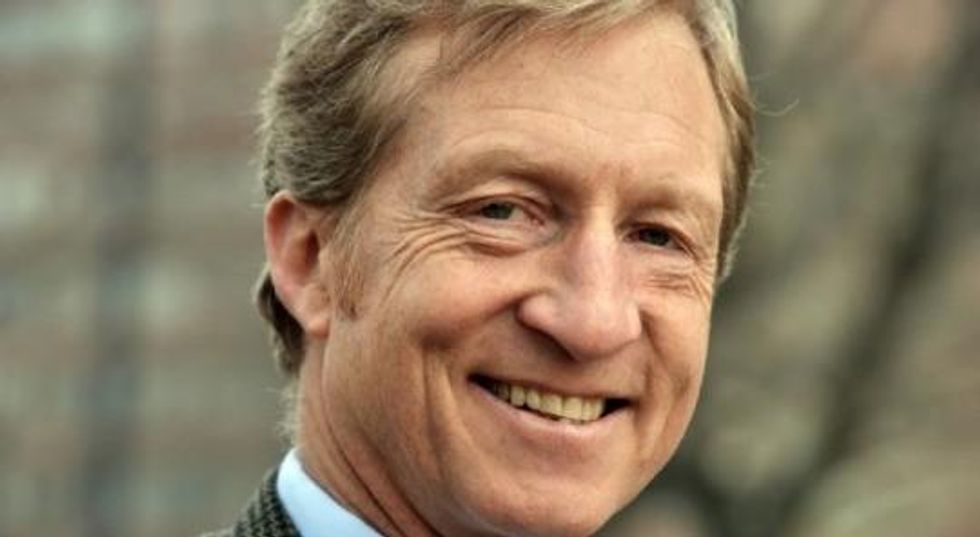On Tuesday, the New York Timesreported that Steyer, who is worth an estimated $1.5bn, plans to spend $100m (or more) during the 2014 US midterm elections. And he plans to spend all of it demanding that state and federal legislators take action to slow the rapid warming of the planet. It is by far the biggest single-person, single-issue commitment in the crooked recent history of campaign finance, and politicians who deny the science of climate change or block Steyer's efforts can expect a blitz of negative ads from his organization. For the Republican Party, the 56-year-old Steyer is the next liberal bogeyman, the heir to Soros. For the environmental movement, he's the new Daddy Warbucks.
Steyer, like many of his fellow liberal mega-donors, bemoans the political playing field left in the wake of Citizens Unitedand other court decisions, in which an astronomically wealthy few people can freely raise and spend millions. Billions, even. But he refuses to sit on the sidelines, accepting - if not exactly embracing - the new game. If you're a "dark money" reporter like me, you hear it all the time from the left: I hate Citizens United, but I'll play by the rules until the rules change.
But until that day, Steyer and his fellow "donor-doers", as they call themselves, are set to inflict real damage on our democracy. Trust in government can't go much lower, but if the political arena becomes a billionaire's playground, dominated by the voices and interests of a handful of 1-percenters, we may see just how low the public's trust can go. If you think your congressman is "bought and sold" now, wait until his reelection depends on a Super Pac paid for ... by one person.
Environmentalists, of course, could use the reinforcements. Robert Brulle, a professor of sociology and environmental science at Drexel University, calculates (pdf) that the 91 organizations comprising what he calls "the US climate change counter-movement" - the think tanks and trade associations and corporate front groups spreading misinformation about the validity of climate science - have $900m at their disposal each year. Steyer's $100m goal - half the money his own, the rest matched by fellow donors - pales in comparison to the war chest of the fossil fuel industry and its allies.
But don't go celebrating Tom Steyer's quest to save the world just yet. Noble as his intentions may be, his plan to use big money to fight big money is trouble for the rest of us. Indeed, the super-donor arms war further relegates political parties to mere bit players while alienating everyday people - and at precisely the time when their voices and their involvement are needed most.
You can't blame Steyer or Adelson for getting in the ring in a big way. Super Pacs, the steroid-injected siblings of the traditional political action committee, allow anyone with the means and inclination to dump unlimited amounts of money into state, congressional and presidential races. Want to bet the house on your favorite horse? Or get your daughter elected to the House of Representatives? All you need is a good lawyer plus some cash to spare, and you, too, can have your very own Super Pac. Welcome to the era of the billionaire unchained.
Then there are the Super Pacs such as Steyer's NextGen Climate - the operations set up to promote specific issues, come hell or the highest bidder. Former New York City Mayor Michael Bloomberg's Independence USA Super Pac spent $8m in 2012 to support pro-guns-rights candidates and attack allies of the NRA, cementing its status as the biggest counterweight to the mighty gun lobby. There's even a Super Pac financed by Jonathan Soros, son of George, focused on the issue of campaign finance reform - an anti-Super Pac Super Pac. ("Embrace the irony," Soros likes to say.)
For the more camera-shy donors, political nonprofit groups afford complete anonymity and the opportunity to play in elections and shape the national debate. Most notably, the universe of nonprofits tied to Charles and David Koch, the multibillionaire industrialists, churned through more than $400m in 2011 and 2012 to fund attacks on President Obama, get-out-the-vote efforts and issue ads blasting Obamacare and new environmental regulations.
More and more, the Steyers and Adelsons and Katzenbergs and Kochs are playing central roles in American politics. Mega-donors can choose the candidates, prop up the issues, set the message and then place their bets. Meanwhile, the political parties, which for generations have acted as a moderating influence in the picking and electing of candidates, slide into irrelevancy. Sure, you may be disillusioned with the Democrats or the Republicans - but would you rather a handful of Wall Street bankers, Hollywood moguls or oil executives handpick the candidates in secret instead? Here's how a prominent Democratic activist put it to me:
It'll be wealthy people getting together and picking horses and riding those horses through a primary process and maybe upending the consensus of the party. We're in a whole new world.
I'd wager that that's not a world Tom Steyer wants. And I don't mean to pick on him: my hat's off to Steyer for committing to make climate change the rallying cry of our generation. But no matter how much money he spends, the "merchants of doubt" on the other side will marshal as much money or more. Fred Wertheimer of the reform-minded Democracy 21 group said it well when he told the Times, "This is about as far away as we can get from 'representative democracy'".
